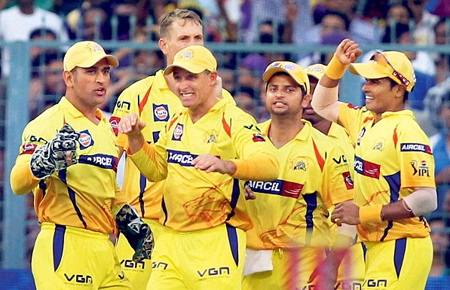 New Delhi, Dec 25: The Indian Premier League governing council on Tuesday gave the go-ahead to a new plan that is expected to give the rich franchises an advantage over the not-so-rich ones.
New Delhi, Dec 25: The Indian Premier League governing council on Tuesday gave the go-ahead to a new plan that is expected to give the rich franchises an advantage over the not-so-rich ones.
Under the revised player regulations issued by the IPL, to be implemented for the 2014 season, each team will be allowed to retain five players from its 2013 squad, including those who were ruled out due to injury and those who were brought in to replace them.
This will need to be done by January 10, with the auction set to take place at an undisclosed location on February 12, to be extended to the next day if necessary.
In addition, each franchise will get the option of buying back a limited number of players in the auction through a newly-introduced 'right to match' provision.
While in theory this seems a fair system with a level playing field, in practice it will play into the hands of mega-buck franchises such as Chennai Super Kings and Mumbai Indians, while small franchises like Kings XI Punjab and Rajasthan Royals, who have been known to spend little at the auctions, could miss out on the top stars yet again.
This is because while the salary cap for each franchise has been fixed at Rs 60 crore, and retention of five players will mean just Rs 21 crore available for buying a minimum of 11 more players, the actual player fees have been left to the players and franchisees to negotiate.
So, for an impact player such as Chris Gayle, his current team Royal Challengers Bangalore could offer any amount as the fee for him to stay put, and it will only count as Rs 12.5 crore against the salary cap.
Players will be ranked from one to five for salary cap deduction purposes on the basis of this actual fee.
'Right to match' (RTM) is a concept that some smaller franchises have been grumbling against behind the scenes, but it has been accepted by the governing council with one rider - the more players a franchise retains, the less opportunities it has to 'match'.
So if a team has retained three to five players, it will get just one RTM opportunity, while a team with no retentions will get three.
What this means is that for any player who was in a franchise's 2013 squad, once the bidding at the fresh auction has been completed and the auctioneer is satisfied that no more bids will be forthcoming, he will declare the player "sold".
He will then ask his previous franchise if it wishes to exercise one of its remaining RTMs.
If yes, the franchise will buy the player for the highest bid, without necessarily bidding for him.
This could work in case of a player who went for a high price in previous auctions, but has lost form or didn't perform up to expectations.
In such a scenario, the team can allow other teams to bid, and if the bid doesn't go high, it can buy him back for a fraction of the previous price.
The maximum number of capped Indians that can be retained beforehand or bought under RTM cannot exceed four.
Among other changes, all players - whether capped or uncapped, Indian or foreign - have to enter the auction.
All transactions will take place in Rupees instead of US Dollars, with foreign players getting paid in a currency of their choice as per the best available exchange rate.
The maximum number of foreign players per team has come down from 10 to nine, and the overall squad size from 33 to 27.
The minimum squad strength is 16, and the minimum amount to be spent at the auction is Rs 36 crore.





Comments
Add new comment